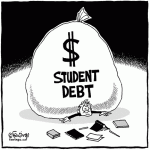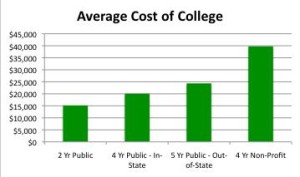Podcast: Play in new window | Download
This is Part II of an interview with Julie, a College Advisor, who talks about whether the old 4-year college model even makes sense.
Please also see related posts:
Interview Part I – The Rising Cost of College
And College Savings and Compound Interest

Michael: Hi, my name is Mike and I used to be a hedge-fund manager.
Julie: I’m Julie. I am a college advisor for over 25 years.
Michael: Does college as traditionally understood – a four-year institution – make sense anymore? The clear alternatives are:
1. Community college for a few years and then enroll and do the final years for your terminal degree
2. Or online learning
3. Returning to more vocational learning.
Julie: I think all three of those have to be much more heavily explored. The only predictor of graduation from college now is family income. Scores, or grades, do not predict graduation from college, only family income. This is not the meritocracy that we like to think we have. It’s really sad that that’s the case. I would like to see, instead of more and more beautiful and elaborate live-away-from-home paradises at higher and higher costs, with many many more administrators, I would like to see some change along those lines, those three that you mentioned, and see if we can get back to some sort of reality.
WHAT DOES COLLEGE REALLY GIVE US?
Michael: In your opinion, what does college at this point really give you that can’t be otherwise obtained online or with more vocational training? Is there something that you just can’t get or are we just not exploring deeply enough what you can get? I’m interested historically, 50 years ago versus today but also just today and for the next 30 years; do we just have the wrong model or is there something intrinsically essential to the traditional four-year college model that you really can’t reproduce in any other way?
Julie: I would find it hard to know what that is. I think the kind of education that my students get in high school is I think life changing and it’s a very intense experience intellectually as well as in terms of the skills. The whole myth of the “college experience”: living away from home probably for the first time, it seems to be very heavily involved in alcohol consumption.
I’m not saying this is new but I just don’t know that it’s absolutely necessary. I also think that many students are not getting an exciting intellectual experience. They’re in big lecture halls, if they even go to the lecture. Class participation is based on pushing a clicker to show you’ve been there. Is that really going to get them much, change them in some fundamental way for the better? I’m not convinced. I think we really need to rethink a lot.
Michael: It’s pretty grim sometimes when I think about it. College at the elite level seems to be somewhat about training the mind a little bit; a lot about cultural capital you acquire through friendship networks and broadening your horizons. Whatever small community you came from suddenly is expanded. Then in a large sense it seems to be market signaling to potential employers and potential mates and potential colleagues; that I’m a person of your group, as shown by my degree from that institution you’ve heard of. That seems to be a lot of value, like buying a brand. It’s not the value we admit that it has, which is supposed to be “I got a great education.” But it seems that’s a very small part of it.
Julie: Granted, it’s certainly what a lot of my families want and what I got and you got. But that’s just a very small number of people in this country that are going to end up with that little extra branding.
IS A PRIVATE COLLEGE AT $50,000 A Year A GOOD DEAL?
Michael: Outside of the market signaling and cultural capital you acquire at an elite place, what are you getting for something below that, but you’re still paying pretty much full freight at $50,000 a year? Is that a good deal?
Julie: I think it’s okay if you have a lot of money and you want to spend it. But I don’t think it’s a great deal. It’s hard for me to think there are places where you should spend 50,000 dollars instead of 25,000 dollars. Now, granted, a great many people are going to get financial aid and decent merit aid, so for the majority of people it isn’t a question of 24,000 versus 55,000. There’s going to be a narrower gap. But for you who just went online and found out that you’re supposed to come up with the first 50,000, you could go to the University of Texas for probably 20,000. What would make you think that you’d want to mortgage your life and your child’s life to spend the extra $30,000 per year?
Michael: It’s got be very worthwhile.
Julie: Yeah and I’m not sure that anyone is offering that big a difference, even if we compared top status with University of Texas status. That’s a lot of difference, unless you really are rich.
TEXAS GOVERNOR RICK PERRY PUSHES A $10,000 COLLEGE DEGREE
Michael: One of the agendas of Texas Governor Rick Perry, interestingly enough, is instituting the 10,000 dollar a year undergraduate education,[1] which is so far mostly talked about rather than implemented. It’s not available yet, I don’t think.[2] But it’s seemingly a big agenda of his. It seems to be something we would applaud and you would think this is technologically available and totally necessary. If you could get the learning part of it not to be out of reach at 10,000 dollars a year, it would be harder to acquire the cultural capital of living together but as you said; much of that may be beer-based.
Julie: I am a big believer that many, many things about education require some group activity with a teacher. But that doesn’t have to be – and I don’t really see a great deal of value in – the 250 people in the lecture hall being lectured to by the professor. I cannot see why a lot of stuff couldn’t be done online. And of course a lot of the students know it’s online and they don’t go to the big lecture. And then save the money for the small encounters with the other students and the teacher. Which would then we hope some of that would really be meaningful.
Michael: If Rick Perry was really able to institute the 10,000 dollar undergraduate education in Texas, that would be pretty transformative. I think people would pay attention. It seems the market for undergraduate education is ripe for a disruptive innovation there. I think it’s a bubble, and if interest rates change, that bubble could burst and these not-quite -top-tier colleges could be in deep trouble trying to justify – why are you charging $50,000 when this other group has figured out how to provide essentially the same product for $10,000? It would be interesting to see. It’s a neat idea of an experiment. It seems like the industry is ripe for disruption that way.

EUROPEAN AND ASIAN UNIVERSITIES ARE DIFFERENT
Julie: I would be very interested. Keep in mind that in Europe and Asia, developed countries, there is no great tradition that the majority of students go off and live in a dorm for four years. That’s a luxury item that we’ve invented. That’s not to say people aren’t doing that, some people, but it’s much more common that you go to university in your area, your town.
Michael: Living at home, saving that money, and spending only on tuition.
Julie: Yeah, and some great universities have operated that way in Germany, France, and elsewhere. I would like to see much more emphasis on how can you have your big lectures done for less, and if it has to be electronically that’s okay with me, and then how can you have some meaningful student involvement with their peers and teacher in a way that really works. A section of 40 people, that doesn’t work. I’m now ready for a lot of experimentation.
I’ve loved being educated. I love working in the school. I’m definitely not one to feel people don’t need more education but we really need to be thinking of some different models. We need to be thinking of lifetime learning. We need to think about whether our government policies need to be directing and encouraging students to certain kinds of careers as opposed to others.
We have no national policy that pushes some of the education we know we need to push, such as engineering, science, math. Other countries have maybe too rigid a policy. Ireland has decided it’s going to come back from its financial debacle by having the government be very involved in what it’s going to support in terms of education. That’s what is going to put them back on their feet. Maybe that’s a model that would be way too coercive for us. But is it really a good idea that we have no national policy that I can discern?
Michael: They’re going to determine how many engineers per year, how many dentists per year, that kind of thing?
Julie: They’re certainly going to put their money where they think the economy should be going. We’re not doing that.
Please also see related posts:
Interview Part I – The Rising Cost of College
And College Savings and Compound Interest
And College Savings vs. Retirement Savings
[1] I had this wrong in the interview – Its actually $10,000 total, a much more ambitious target. Here’s some more information on the plan. The Austin-American Statesman says the target is sort-of, kind of, reachable.
[2] Actually – My information in this interview was not correct. It is available. But it’s not very widespread yet. The program requires a student to accumulate many college ‘credit hours’ during high school, it may rely heavily on online learning, and the $10,000 all-in cost usually does not include books.
Post read (6433) times.


